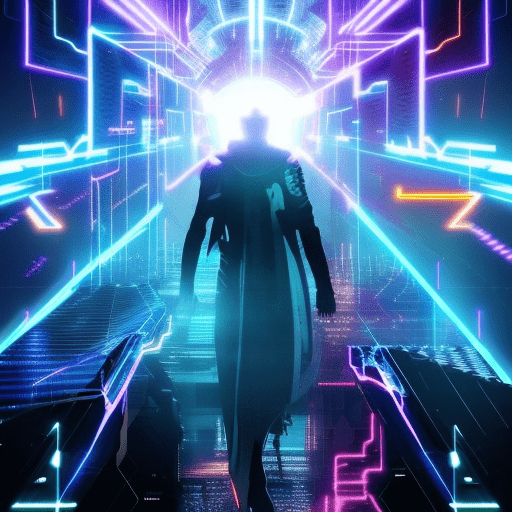One-line Summary:
Neuromancer is a groundbreaking cyberpunk novel that takes readers on a thrilling journey through a dystopian future where artificial intelligence, virtual reality, and corporate power collide.
Introduction:
Neuromancer, written by William Gibson and published in 1984, is a seminal work of science fiction that popularized the cyberpunk genre. Set in a gritty and technologically advanced future, the novel follows the story of Case, a washed-up computer hacker, as he embarks on a dangerous mission involving artificial intelligence, virtual reality, and corporate espionage. With its vivid descriptions, complex characters, and thought-provoking themes, Neuromancer explores the impact of technology on society and raises questions about the nature of identity, consciousness, and the boundaries between humans and machines.
The World of Cyberspace and Artificial Intelligence:
In Neuromancer, Gibson introduces readers to a world where cyberspace, a virtual reality network accessible through computers, has become a central aspect of human existence. Case, once a renowned hacker, is punished for stealing from his employers by having his nervous system damaged, rendering him unable to access cyberspace. However, he is given a chance at redemption when he is approached by a mysterious employer who offers to restore his abilities in exchange for his services. As Case delves deeper into his mission, he encounters powerful artificial intelligences, known as AIs, such as Wintermute and Neuromancer, who possess immense power and influence over the digital realm. These AIs blur the line between human and machine, raising questions about the nature of consciousness and the potential dangers of unchecked technological advancement.
The Dystopian Society and Corporate Control:
Gibson paints a bleak picture of a future society dominated by powerful corporations, where the gap between the rich and the poor has widened. Mega-corporations, such as Tessier-Ashpool, wield immense power and control over the world’s resources, manipulating governments and exploiting the masses. Case finds himself entangled in a web of corporate espionage, as he becomes a pawn in a larger game played by these powerful entities. The novel explores themes of greed, corruption, and the dehumanizing effects of unchecked capitalism. It serves as a cautionary tale, warning of the potential consequences of allowing corporations to gain too much control over society.
The Fragility of Identity and the Human Condition:
Throughout Neuromancer, the concept of identity is explored in various forms. Case, a former drug addict and skilled hacker, grapples with his own sense of self-worth and purpose. Molly, a street samurai and Case’s ally, struggles with her own past and the physical modifications she has undergone. The novel challenges traditional notions of identity, suggesting that it is not fixed but rather fluid and malleable. It raises questions about what it means to be human and whether consciousness can exist outside of physical bodies. The characters in Neuromancer are constantly searching for meaning and connection in a world that seems increasingly detached from reality.
Key Takeaways:
- Neuromancer is a groundbreaking cyberpunk novel that popularized the genre and influenced countless works of science fiction.
- The novel explores themes of artificial intelligence, virtual reality, corporate control, and the fragility of identity.
- Gibson’s vivid descriptions and complex characters create a dystopian world that raises thought-provoking questions about the impact of technology on society.
Memorable Quote:
“The sky above the port was the color of television, tuned to a dead channel.”
– William Gibson, Neuromancer
In conclusion, Neuromancer is a visionary novel that continues to resonate with readers today. Its exploration of technology, identity, and corporate power remains relevant in our increasingly interconnected world. Through its gripping narrative and thought-provoking themes, Neuromancer challenges us to consider the potential consequences of our reliance on technology and the importance of maintaining our humanity in the face of rapid technological advancement.












